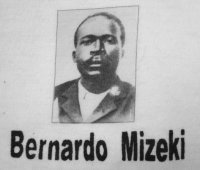From Church Leaders
[Source: Bishop Dinis, June 2009]
One of the highlights of liturgical observance in Mozambique is the way the Church marks some events of BERNARD MIZEKI, Catechist, Missionary and Martyr.

Born at Gwambene near Inharrime in the Province of Inhambane, six hours drive from Maputo, in the Diocese of Lebombo, he was named Mamiyeri Mizeka Gwambe +-1860.
He left his peaceful village to emigrate to South Africa, advised by some cousins to get a job as many other young men at that time. Travelling on foot, horse, boat and steamer he reached Cape Town where he worked as a domestic worker. In the evenings he attended a school run by some Priests who also taught hem about the Christian Faith and he was baptized with others from south Africa and Lesotho on 7 March 1886. He became known by his good manners, hard work and reconciler. Soon he heard of plans of establishing Anglican Work in the then Rhodesia by Bishop night Bruce and his request to have an African to go with him. Bernard (this is the name he took when he was baptized) offered to go with the Bishop and they sailed to Beira and on by steamer to then Rhodesia. He was instrumental in establishing Anglicanism specially among the Black Population before he was martyred 18 June 1896.
Soon after arriving the field, Bernard learned and mastered the local language, Shona, taking as basis his little English learned in evening classes in Cape Town. He used his knowledge of languages to translate the basic tools for his Anglican ministry as a Catechist or Lay Reader.Thus within a short time he translated the catechism, morning and evening prayer and the eucharist from the Book of Common Prayer. He was based near Marondellas at the Mangwendes village, teaching catechism and leading services as people converted into Christianity. Among the new members of the Church was Lily Muthwa whom he married on the tenth anniversary of his baptism (7 March 1896).
His teaching about the new faith was seen by the local authorities as damaging to their practices and they opposed the growing congregation which Bernard Mizeki so zealously shepherded. The local authorities, taking advantage of the Bishop,s absence to England tried to persuade Bernard to abandon his project and he, like many others in the early Church saw his loyalty to Jesus and declared ready to face whatever consequences. Even his wife Lily tried to persuade him to flee to no avail, such was the depth of his commitment to his missionary call.. On a cold night of 18 June 1896, 3 months after his marriage, Bernard was badly wounded with a spear on the side by attackers sent by local authorities. He had time to give a message to his mourning wife , namely that he was dying but the work would continue with people who would come, she should go to see the Priest for assistance, that she should complete her catechism to be baptized both her and the baby she was carrying already. Bernard died afterwards leaning on a rock where a Bright shining light could be seen around a dying Bernard. His body was never found. About 40 years after his death the place of the martyrdom became a place of pilgrimage every year on the week end nearest to l8 June. At the Centenary of the martyrdom there were more than 10000 people from Zimbabwe, South Africa, USA, U.K., Mozambique, Malawi, Botswana and Zambia. Esperança Berta challenged Mozambicans to see themselves as the “OWNERS OF THE CELEBRATIONS OF BERNARD MIZEKI” because we are “parents” of this great son of Africa. Mozambicans have been making pilgrimages to Marondllas in Zimbabwe since 1986 every year. Last year and this year, because of the danger that looms at the shrine given the political interferences in the life of the Church, Mozambicans have their pilgrimage to the nearest town to Zimbabwe, Chimoio where there is an alternative or additional shrine.
Since 2003, having discovered the exact place of Bernard’s birth, there is a pilgrimage to Gwambene the first week end in March and Zimbabweans cross the border to travel more than 1000 kms to thank God for this great son of Africa, of Mozambique,of Anglicanism and of Lebombo, we praise and thank God for this Layman, Missionary and Martyr, BERNARD MIZEKI
It is only recently that Gwambene has become a place of pilgrimages and therefore the needs to make it reasonably comfortable are before us.
May God raise more lay leaders like Bernard whose fruits and even seeds of his labour are blessing so many, 113 years after his death.
(There is also information about Bernard Mizeki in the Partner Dioceses part of this site.)